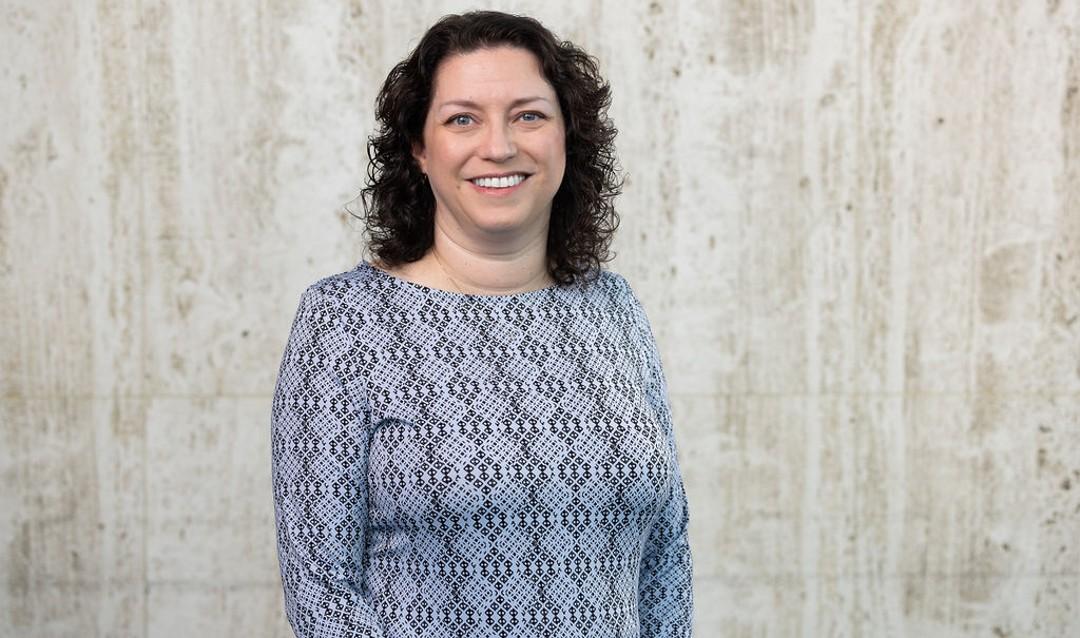Like many of the most interesting journeys, Grace Caskie’s professional path was not straightforward.
A first-generation college student, Caskie had strong math skills and initially thought she would become a high school math teacher. “As is pretty typical with first-gen students, I think, I really didn’t know all of the possible majors that were out there,” Caskie, associate professor of counseling psychology, says. However, a psychology course early on introduced Caskie to the world of quantitative psychology. This discovery brought together her math skills and newfound interest in psychology.
Al Forsyth, then a faculty member at Millersville University, was an early mentor who encouraged Caskie to change her major to psychology.
“Even after I became a psychology major, I kept taking statistics classes in the math department,” Caskie says. “Then in my senior year, Al said, ‘I think it would be really good for you to go to graduate school.’” With that encouragement, another door opened. Caskie chose the quantitative psychology doctoral program at the University of North Carolina, under the mentorship of Abigail Panter, and the program proved to be a good match to her interests.
After teaching statistics to undergraduate psychology students at UNC several times, Caskie worked at the Frank Porter Graham Child Development Center during the last two years of her graduate program, conducting statistical analyses and data management under the mentorship of Margaret Burchinal.
“My master's thesis and my dissertation were methodologically oriented and focused on children and adolescents,” she says.
As Caskie finished up her dissertation, her advisor suggested that she apply for a postdoctoral position to work on research projects housed within Penn State’s Gerontology Center. Her work with the Gerontology Center expanded Caskie’s research interests to include older adults. Caskie ended up spending six years at Penn State.
“I often joke that I got a second Ph.D. in that six-year period,” she says. “I attended weekly colloquia, lab meetings, and did a lot of reading and research.”
At the Gerontology Center, Caskie also met another important mentor—K. Warner Schaie. A world-renowned gerontology researcher, Schaie, who died in 2023, was director of the Center and led the Seattle Longitudinal Study (SLS) along with his wife, Sherry L. Willis. The mentorship provided by Schaie and Willis informed Caskie’s own research focusing on older adults once she accepted a faculty position with Lehigh’s College of Education (COE).
When Caskie started with the COE, a large part of her job was supporting other faculty and students as a methodologist. Over time, the College hired additional faculty with strong backgrounds in statistics, including Joan Fu who took over that role full time. This allowed Caskie to spend more time on her own research, although her teaching responsibilities remained statistics courses offered to students across the COE’s programs.
“Our students are incredibly bright and hardworking,” she says. “My courses are challenging, but I also try to provide lots of support along the way.”
Caskie knows that students have often had bad experiences with math classes or statistics in the past. And most COE students are coming to the COE to become principals, teachers, and counselors, not statisticians. However, Caskie helps her students see how proper use and deep understanding of statistical analyses can improve their professional practice—whatever that practice is.
Lauren Tillstrom Biegley, a Ph.D. student in Teaching Learning and Technology, regularly applies what she learned in Caskie’s introductory statistics class to her research.
“I saved the binder from Grace’s class, and I go back through it to run my stats analyses,” she says. “However, I most appreciate the passion and genuine excitement Grace has for statistics and teaching it to others.”
That enthusiasm is evident when discussing statistics with Caskie—even casually.
“I think everybody wants to learn to use the methodologies properly so that they can correctly interpret the literature that they're reading,” Caskie says. “I try to give students many opportunities to think about how these techniques can be applied to their own field.”
As for Caskie’s area of research, gerontology is a field that is growing. She shares that, by 2035, older adults (65+ years) will outnumber children (18 years and under) for the first time in U.S. history (U.S. Census Bureau, 2018). And, understanding how to support well-being and promote quality of life for this growing segment of our population has both societal and economic implications (Levy et al., 2020).
“In my research, I've been mostly studying how health and cognition are linked,” says Caskie. “Most recently, I’m examining how health and cognitive status influence trainees’—in particular counseling psychology and clinical psychology trainees’—perceptions of their work with older adult clients.”
Although baby boomers represent a significant growth in the number of older adults in the United States, Caskie says very few (less than 2 percent) of psychologists specialize in this population. Her research approaches the mismatch in two ways. “One is looking at what might motivate more interest in working with older populations,” she says. “The other is determining how health and cognitive status impact perceptions of older adults—not just by psychologist trainees, but by the general public.”
Recently, Caskie’s career came full circle at the 2024 American Psychological Association (APA) conference in Seattle. She chaired a symposium at the conference titled, Impact of K. Warner Schaie's Work on the Fields of Adult Development, Aging, and Lifespan Psychology.
“I put this symposium together for APA because Schaie had started the Seattle Longitudinal Study in 1956, and APA was held in Seattle this year,” Caskie says. “The timing seemed perfect to honor his memory.”
She also led the completion of fundraising as APA Division 20 president for the recently renamed K. Warner Memorial Fund for Adult Development and Aging.
“One of my presidential initiatives prioritized mentorship and funding for students and early career professionals,” she says. “As part of those efforts, we raised $100,000 to fully fund the memorial.”
To learn more about Caskie and her research, please visit her faculty page on the COE website.
Story by Beth Blew


